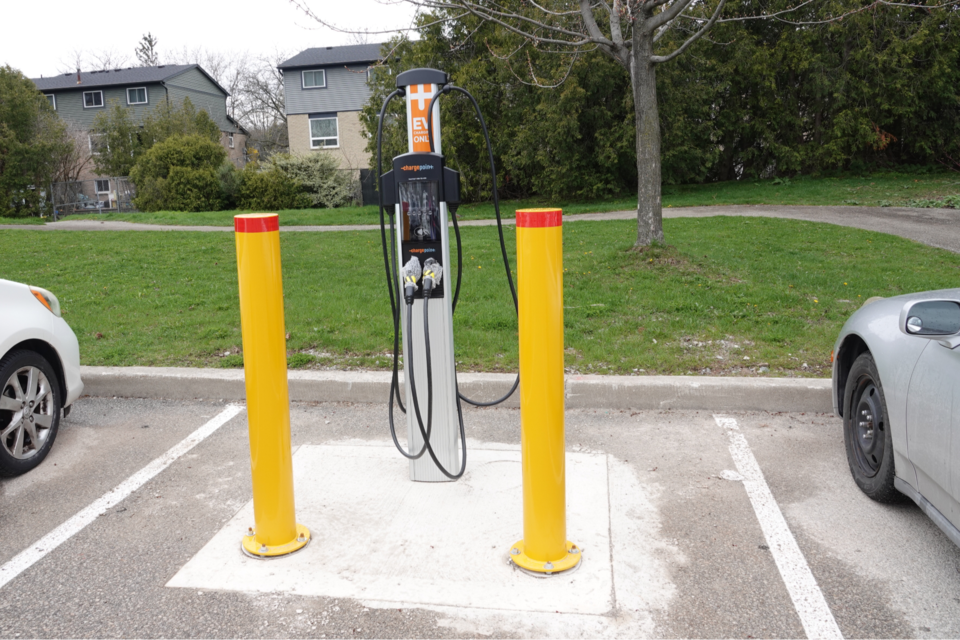The City of Greater Sudbury needs more public-use electric vehicle charging stations.
This, according to a municipal report which city council members were unanimous in supporting during Tuesday’s meeting.
With Tuesday’s city council support, the city is anticipated to issue a request for proposal for “the provision of up to 10 level two public facing electric vehicle charging stations, including capital investment, installation, maintenance and administration at little to no additional cost to the city.”
Although the motion of city council indicates “up to 10,” city Assets and Fleet Services director Shawn Turner clarified to city council members on Tuesday that staff have had discussions with service providers, and that “10 could be changed” based on their response.
There are 32 public charging stations in Sudbury, according to Turner’s report, which is the lowest per person among comparator municipalities listed (Thunder Bay, North Bay, Sault Ste. Marie, Barrie, London, Windsor, Kingston).
There were 1,568 electric vehicle registrations in the city at the latest update, which is mid-range among these comparator municipalities.
Possible options for public charging stations at little or no cost to the city include leasing land to be used for charging stations.
“Ensuring sufficient public charging infrastructure availability is key to the electric vehicle transition,” according to Turner’s report. “While a significant portion of charging is typically done at home overnight, public charging infrastructure provides additional flexibility for EV drivers covering longer distances, such as tourists, and provides an alternative for those without access to charging at home.”
Another environmentally centred report tabled during Tuesday’s city council meeting was about energy and related costs at municipal facilities.
It clarified that city facilities (excluding housing operations) tallied an overall total energy use of 109,851,045 equivalent kWh in 2023, which was a 9.8-per-cent reduction from 2022.
Although a step in the right direction, the report by Turner clarified that the drop in natural gas consumption recorded during this timeframe was largely explained by variances in temperatures.
The report also notes that those buildings to receive modern upgrades to reduce energy use have proven successful. The replacement of lighting with efficient LEDs alone has reduced annual energy use by 2,211,315 kWh alone ($287,471).
Various upgrades are being considered to such things as insulation, windows, doors, lighting and HVAC systems to reduce energy consumption, alongside other efforts, according to Turner’s report.
“We’ll continue to apply for grants that we can help to offset some of those costs,” he said.
Although there was no recommendation attached to Turner’s report, Mayor Paul Lefebvre introduced a successful motion directing staff to “explore additional funding opportunities that align with our community’s portfolio of buildings and facilities for energy efficiency initiatives, and that staff provide updates on opportunities upon regular reporting on the CEEP (the Community Energy and Emissions Plan).”
The two environmentally centered reports discussed on Tuesday were the latest in a series coming out of city hall in response to a successful motion Mayor Paul Lefebvre tabled last year. This motion requested reports throughout 2025 to help address the city’s Community Energy and Emissions Plan goals.
The previous report was presented to city council members in April, and resulted in city council approving a three-year pilot program consisting of “coaching service … to guide homeowners through the process of achieving greater energy efficiency in their home.”
During both the April meeting and the one Tuesday night, the Coalition for a Livable Sudbury encouraged residents to attend the meeting in a show of support.
Although Sudbury.com identified these advocates as “environmentalists” in past reports, Coalition for a Livable Sudbury chair Naomi Grant later contended that doing so “is a disservice to the issue,” with supporters coming from various social justice, sports, arts and science backgrounds and that climate action isn’t an issue for environmentalists alone. “The human and financial costs of the changing climate are huge,” she said.
Tyler Clarke covers city hall and political affairs for Sudbury.com.




